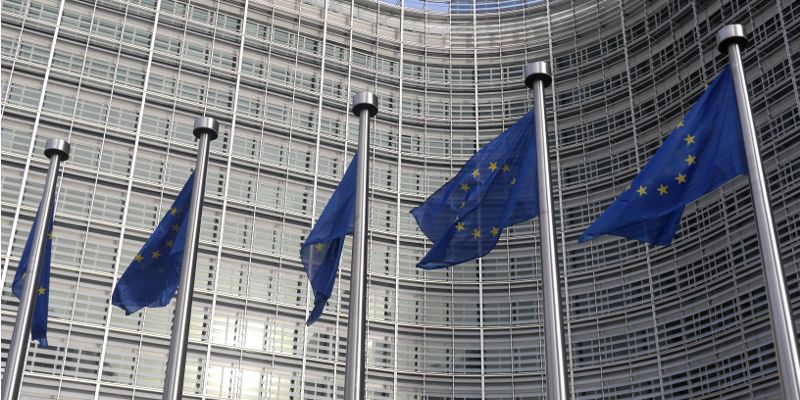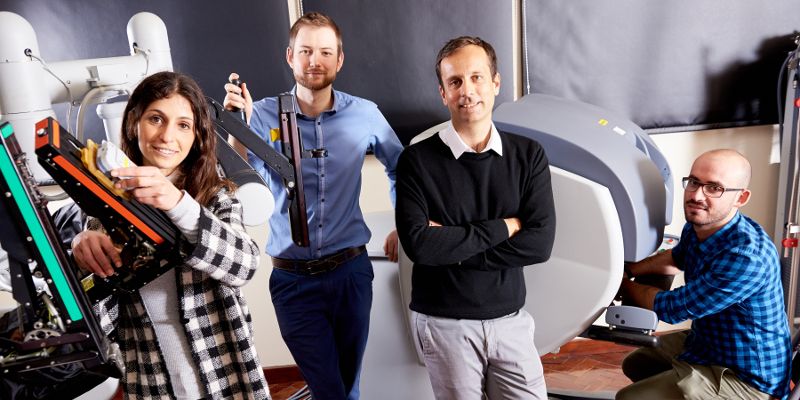
Robotic tentacles to help surgeons operate inside the body, and understanding what characterises the will of the people are among new research programmes at Leeds supported by European funding.
The University received more than €19m in funding from the prestigious and highly selective European Research Council (ERC) during 2018. The figure places Leeds in the top 10 recipients of ERC funding among UK universities for the first time.
Since the referendum when the country voted to leave the EU, the University has actually risen in the ranking produced by the Department of Business, Energy and Industrial Strategy from 12 to seventh place.
During 2018, the European Research Council supported nine diverse programmes at Leeds, worth a total of €19,291,485. Seven programmes were launched during the year, while two received approval and funding:
Novel Lifesaving Magnetic Tentacles

Professor Pietro Valdastri and members of his research team.
Lead academic: Professor Pietro Valdastri
School: Electronic and Electrical Engineering
Grant: €2.7million
Details: This programme aims to examine how to enable intelligent tentacle-like robots to help surgeons by reaching deep into the human anatomy. It will combine robotics, magnetics, manufacturing and medicine approaches, and is the first time such robotic systems have been proposed. Success in the programme would ultimately lead to improved quality of operations and better results for patients.
Group Thinking: New Foundations
 Protesters outside the White House in America.
Protesters outside the White House in America.
Lead academic: Professor Robert Williams
School: Philosophy, Religion and History of Science
Grant: €2million
Details: This project aims to transform understanding of collective representation, its nature, and its significance. It seeks to reveal the underlying unity between the facts that constitute the beliefs and desires of individuals, and the facts that constitute the beliefs and desires of groups. Claims about 'the will of the people' are a central and hotly contested part of public discourse, and this project will bring rigour to such talk by identifying the facts that must be checked to determine whether the claims are right or wrong.
In addition to the European Research Council funding, in January the European Commission supported two substantial PhD training networks led by Dr Paolo Actis from the School of Electronic and Electrical Engineering (SENTINEL) and Dr Bruce Turnbull from the School of Chemistry (SynBioCarb), worth more than Euros 8million. They are aimed at building skills among postgraduate researchers and sharing knowledge across boundaries.
Together funding for the programmes demonstrates European confidence in the University’s depth of experience in interdisciplinary research and the breadth of its expertise.
Professor Lisa Roberts, Deputy Vice-Chancellor: Research and Innovation said: “Leeds has a proven strength in our ability to organise, lead and deliver major research and training programmes that make a real and telling difference to the world around us, while driving forward the advancement of science and critical thought.
“It is very pleasing to see that even amid the Brexit politics, we are continuing to collaborate with major European institutions as we all recognise that interdisciplinary international research partnerships deliver real value and impact to society.
"By continuing to work together and pushing at the edges of our collective knowledge, we can conduct research that saves lives, creates new technologies and helps us improve the complex world we live in.”
The University’s Vice Chancellor highlighted the success in a message to staff in December.
UK funding for world-leading research
As well as European funding, Leeds also receives financial support to deliver world-leading and internationally excellent research from a number of UK sources.
In November 2018, new data from the Times Higher Education magazine showed Leeds was in the top 10 UK universities for UK research council funding.
Earlier in the year, Research Fortnight listed Leeds as among the top three universities for securing funding to carry out Global Challenges Research Fund and Newton Fund studies, making a difference around the world. These funding streams are part of the UK Government’s official UK Aid programme.
The Engineering and Physical Sciences Research Council, part of UKRI has also announced that Leeds will receive more than £15m to fund three Centres for Doctoral Training in the latest funding announcement.
Further information
For media enquiries email the University of Leeds Press Office at pressoffice@leeds.ac.uk.